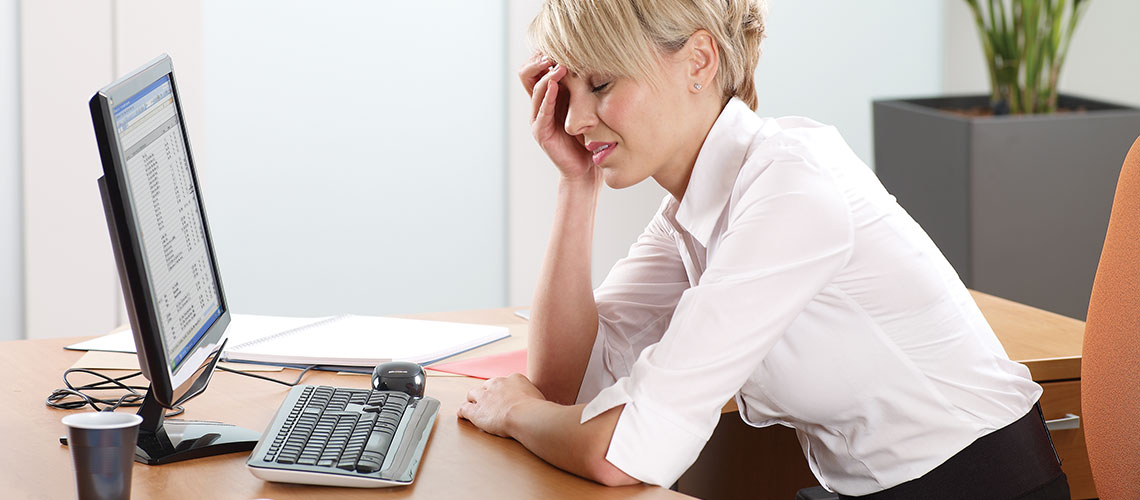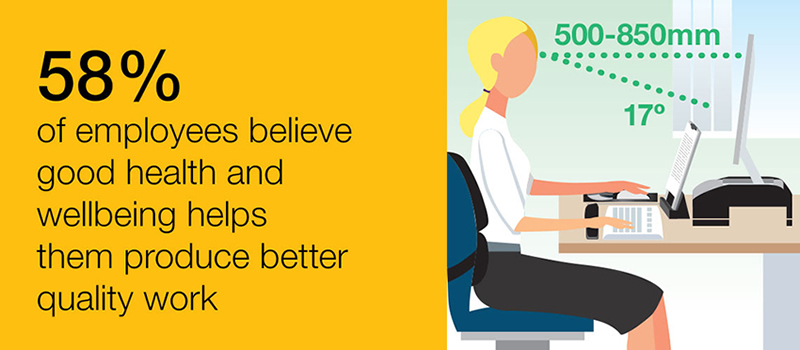
More than half (56%) of European workers are currently going to work when their performance is negatively affected by work-related health issues – and almost a third (29%) of workers have admitted they have even considered moving jobs due to the negative impact of their work environment on their health.
Presenteeism is the new absenteeism
Despite their best intentions, employees coming into work when sick are contributing to a rising trend of ‘presenteeism’ across Europe. When a worker is present but not able to perform their function properly, their productivity is compromised. With most employees continuing to work below-par rather than taking time off to recover, the effect of their illness is often prolonged, which then has a detrimental knock-on impact on the quality and volume of work produced, with a further impact on overall business performance.
According to research carried out by Fellowes, 33% of European employees suffer regularly from backache and 31% from neck ache as a direct result of how they are working. In addition, as many as 1 in 5 workers highlighted weight problems, and 1 in 10 cited an increase in blood pressure as a result of poor wellbeing at work.

When analysing the cause of these health issues, the lack of awareness about good working practices in businesses becomes clear. The main bad habits employees admit to in the workplace include; poor posture when sitting at desks (49%), not drinking enough water during the day (41%), and sitting for too long without taking a break (41%).
A preventative, rather than curative approach is needed by leadership.

Presenteeism is an issue of growing concern for business leaders. In the research, senior managers identified improving morale (48%), productivity (45%) and creating a healthier workplace (38%) as their top priorities - yet, only 47% of employees are aware that their employers currently offer health and wellbeing initiatives to address these areas. What’s more, almost half (43%) of the European workforce don’t think their employers are doing enough to look after their general wellbeing.
To tackle this growing problem, employers must start to implement a longer-term, more preventative approach to unhealthy working practices, rather than falling back on tactical ‘quick-fixes’. With 54% of employees saying that they would stay in their jobs longer if more was done to look after their wellbeing, and 58% saying that their work would be of a better quality, the solution to the productivity puzzle is clear. There is a huge incentive for employers of desk-based workers to address the causes of workstation-related health issues to pave the way for a much happier, more engaged and ultimately more productive workforce.
With European businesses already losing a staggering €73 billion annually1 due to absenteeism, employers simply can’t disregard the worsening problem of presenteeism taking effect. Happy and healthy employees do better work, and more of it, making the bottom-line impact simply too significant to ignore.
Across Europe, 74% of senior managers believe that offering health and wellbeing initiatives would enable them to attract better staff.
Connect workspace with wellbeing using Fellowes 4 Zone Approach® in all desk-based environments

As the specialists for workstation ergonomics, Fellowes has developed the 4 Zone Approach® to healthier working for desk-based workers. It’s the ideal guide for ensuring your employees retain good posture when working at a desk – and the perfect introduction to the benefits of Fellowes ‘head-to-toe’ solutions.
Expertly designed to help prevent workstation-related pain and injury, Fellowes ergonomic solutions include FIRA2 accredited monitor and laptop supports, back supports, foot supports and wrist supports with Microban® antibacterial protection.
IT’S THE LAW: Employers are legally obliged3 to conduct workstation risk assessments and to ensure their employees are working safely and comfortably, whatever their location.

Based on findings of Loudhouse Research commissioned by Fellowes 2017 (other than 1. Loudhouse Research commissioned by Fellowes 2016)
2. FIRA International is an Independent Ergonomic Consultancy. Products with this logo are accredited to EU Health and Safety Legislation: BS EN ISO9241/1995/Part 5; EC Directive 90/270 EEC and amends 2002.
3. EC Directive 90/270/EEC
You can call a Staples representative at the following number:
+44 (0) 121 322 1000
You can also fill out the form below and one of our representatives will get in touch with you shortly.